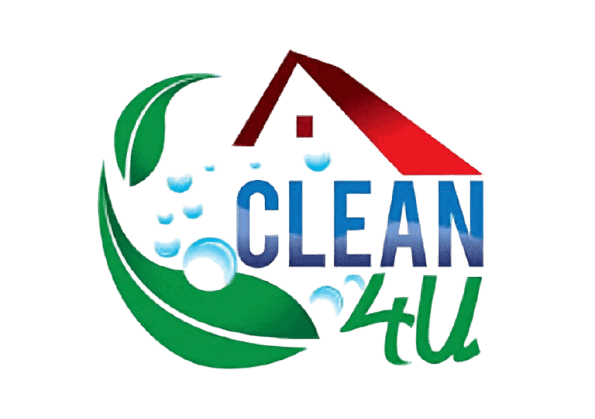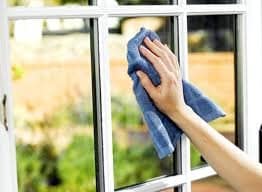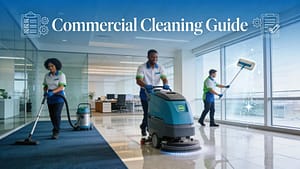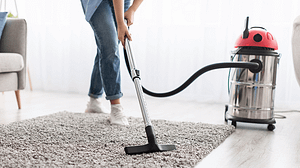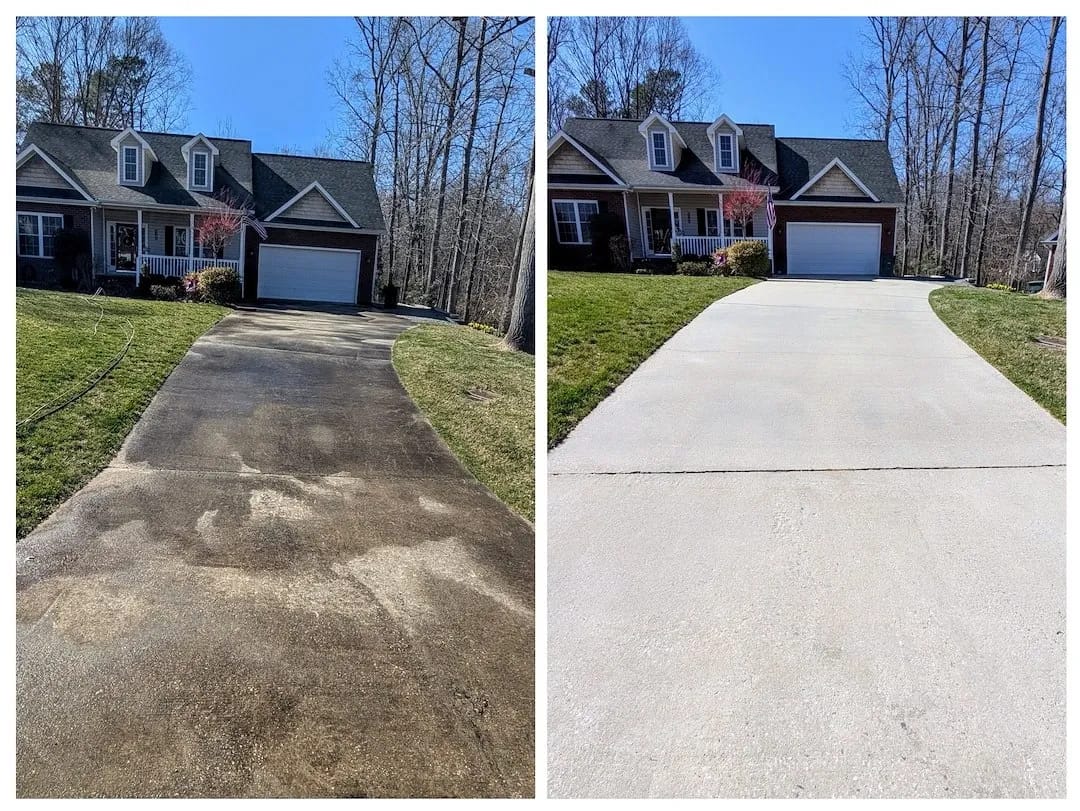 Power washing driveway surfaces has become increasingly popular because it delivers quick and effective results for removing stubborn dirt and grime. If you’ve noticed your once-pristine driveway looking dull and stained, you’re not alone.
Power washing driveway surfaces has become increasingly popular because it delivers quick and effective results for removing stubborn dirt and grime. If you’ve noticed your once-pristine driveway looking dull and stained, you’re not alone.
When considering driveway power washing, cost is often a primary concern. In Ireland, professional power washing services typically charge between €2.50 to €5.00 per square meter, or around €40 to €60 per hour. The final price depends on several factors including the size of your driveway, type of surface, and level of dirt buildup. For instance, small driveways (15–20 m²) generally cost €60–€100, while larger areas (50+ m²) can range from €200 to €400+.
Beyond the cost considerations, driveway power washing offers significant time-saving benefits. A professional can thoroughly clean approximately 1800 square feet of concrete in just 1 hour and 40 minutes. This efficiency, combined with the dramatic improvement in appearance, makes power washing an attractive option for homeowners who want to enhance their property’s curb appeal.
In this comprehensive guide, we’ll walk you through everything you need to know about power washing your driveway—from choosing the right cleaning method for different surface types to deciding whether to hire professionals or tackle the job yourself. Let’s explore how you can transform your driveway from grimy to pristine with the right power washing techniques.
Understanding Driveway Power Washing
The process of power washing transforms dirty, stained driveways into surfaces that look almost new again. Understanding how this cleaning method works helps you make informed decisions about maintaining your property’s exterior spaces.
What is power washing?
Power washing utilizes a high-pressure stream of water to blast away accumulated dirt, grime, mold, and stains from hard surfaces. This cleaning technique harnesses the force of pressurized water, typically delivered at significant pressure levels appropriate for the surface being cleaned.
Unlike standard pressure washing, true power washing adds an important element—heat. Power washing incorporates heated water, creating a more effective cleaning combination. The addition of hot water helps break down stubborn contaminants such as oil, grease, and salt deposits that cold water alone might struggle to remove. Consequently, this thermal advantage makes power washing particularly efficient for tackling tough driveway stains.
Most power washers rely solely on water pressure to lift away dirt and debris, often without requiring harsh chemicals. The equipment directs a concentrated stream that penetrates deep into cracks and crevices, reaching areas that conventional cleaning methods cannot access. For an average two-car driveway, the cleaning process typically takes approximately 1-2 hours, though larger or heavily soiled surfaces may require 2-3 hours to complete.
How it differs from regular cleaning
Traditional driveway cleaning methods involve manual scrubbing, which is both time-consuming and labor-intensive. Washing a driveway by hand can take several hours of tiring work. In contrast, power washing accomplishes the same task in a fraction of the time with significantly less physical effort.
Furthermore, power washing delivers superior results compared to conventional cleaning approaches. The concentrated pressure reaches deep into porous surfaces like concrete and brick, extracting embedded dirt that regular hosing or mopping cannot dislodge. Additionally, power washing uses less water than traditional cleaning with a garden hose, making it a more resource-efficient option.
Professional power washers are specifically designed for industrial-scale cleaning and typically cost more to rent or buy than standard pressure washers. Their specialized nature reflects their enhanced capabilities and cleaning power.
Benefits for your driveway
Power washing offers numerous advantages beyond simple cleanliness. Primarily, this method provides comprehensive cleaning that prolongs the lifespan of your driveway by preventing deterioration and weed growth. Regular power washing removes harmful substances that could otherwise cause long-term damage.
Some key benefits include:
- Safety improvements: Eliminating slippery algae, mold, and mildew reduces fall hazards and creates a safer environment
- Environmental friendliness: Requires fewer or no chemicals compared to other cleaning methods
- Protection against damage: Prevents harmful growths that can lead to expensive repairs
- Enhanced curb appeal: Significantly improves your property’s appearance and potentially increases its market value
- Cost effectiveness: Regular cleaning helps avoid expensive repairs or replacement costs down the line
- Health benefits: Removes allergens like pollen and dust that can affect air quality around your home
The versatility of power washing makes it suitable for all driveway types—concrete, brick, stone, asphalt, and more—though each surface requires specific techniques to avoid damage. This adaptability makes power washing a practical solution regardless of your driveway material.
For stubborn stains, the combination of high pressure and heated water proves remarkably effective at removing years of accumulated dirt, oil, and environmental damage. Many surfaces can be restored to look nearly new after a thorough power washing session.
Factors That Affect Power Washing Costs
When budgeting for a driveway cleanup, understanding the various cost factors is essential for making informed decisions. Several elements influence the final price you’ll pay for power washing services, from the size of your space to your geographical location.
Size of the driveway
The area dimensions primarily determine power washing costs. Naturally, larger driveways require more time, water, and labor, resulting in higher prices. Most professionals charge per square meter or by the hour, with rates typically ranging between €2.50 to €5.00 per square meter. Small driveways (approximately 30-35 square meters) generally cost around €120, whereas larger ones (45-55 square meters) start at €150. Throughout Ireland, a small driveway costs an average of £250 to clean, while larger ones may cost closer to £400.
Type of surface material
Different surface materials require specific cleaning approaches, subsequently affecting the overall cost:
| Surface Type | Average Cost (600 sq. ft.) | Considerations |
| Concrete | €114.51-€181.30 | Requires high pressure settings and specialized solutions for porous nature |
| Asphalt | €124.05-€190.84 | Needs lower pressure settings to prevent damage |
| Brick | €124.05-€190.84 | Mortar joints collect more dirt, increasing cleaning time |
| Pavers | €133.59-€200.38 | Intricate patterns and numerous cracks increase complexity |
| Gravel | €133.59-€200.38 | <citation index=”9″ link=”https://www.angi.com/articles/cost-to-pressure-wash-driveway.htm” similar_text=”Driveway Material |
The surface type significantly impacts both the approach and price—concrete is usually easier and less expensive to clean, whereas block paving or cobblestones often cost more due to additional time needed for thorough cleaning between joints.
Level of dirt and staining
The condition of your driveway notably influences cleaning costs. Heavily soiled surfaces with oil spots, moss, algae, or deeply embedded grime require more time and effort to clean thoroughly. Driveways in poor condition typically take longer to clean and thus cost more. Oil stains or difficult-to-remove marks may necessitate specialized cleaning techniques or pre-treatments, increasing the overall expense. In many cases, pre-treatment or detergents must be applied before power washing to break up stubborn stains and dirt.
Accessibility and layout
The physical arrangement and accessibility of your driveway affect cleaning efficiency and pricing. Tight corners, uneven paths, or nearby landscaping can slow down the cleaning process, increasing time spent and potentially reflecting in hourly rates. Hard-to-reach areas may require special equipment or safety measures, leading to additional charges. Properties with multiple levels or challenging spaces may face higher costs for the extra labor involved.
Regional pricing differences
Location substantially impacts power washing costs. Services in urban areas like Dublin, Cork, and Galway generally cost more than in rural regions due to higher operational expenses. Homeowners in London can expect to pay an average of £45 more for the overall job than those in northern regions. Pricing may also fluctuate during peak seasons (spring and summer) when demand increases. Throughout Ireland, power washing services typically range between €150 and €400 depending on location factors.
Choosing the Right Cleaning Method
Selecting the optimal cleaning approach for your driveway can dramatically improve results while protecting your surface from damage. The right method depends on your specific cleaning challenges and surface type.
Cold vs hot water pressure washing
Cold water pressure washing effectively removes everyday dirt, dust, pollen, and light stains from driveways. This method relies solely on water pressure to clean surfaces, making it ideal for routine maintenance. Cold water systems are faster to set up and more budget-friendly, perfect for general cleaning tasks on wood decks, concrete surfaces, and house siding.
Conversely, hot water pressure washing adds thermal energy to the equation, heating water to temperatures up to 250°F (90°C). This combination of heat and pressure creates a powerful cleaning effect that excels at breaking down oil, grease, and sticky substances. Hot water effectively dissolves tough contaminants, simultaneously sanitizing surfaces and speeding up the cleaning process.
| Method | Best For | Advantages |
| Cold Water | General cleaning, light dirt removal | More affordable, eco-friendly, surface-safe |
| Hot Water | Oil stains, grease, salt deposits | Faster results, less detergent required, sanitizing effect |
When to use detergents or pre-treatments
Pre-treatments essentially set you up for success, especially when dealing with stubborn stains. For soaking pre-treatments, solutions like 30 Seconds Outdoor Cleaner Concentrate or mild detergents designed specifically for pressure washers work effectively. Oil-stained driveways primarily benefit from specialized degreasers applied before pressure washing.
Given that deep stains from organic materials like leaves and grass can be particularly challenging, organic stain removers should be applied and allowed to settle for approximately 15 minutes before scrubbing. For post-treatments, professionals often use diluted solutions of sodium hypochlorite (a type of bleach) to prevent future moss growth.
When using your pressure washer’s detergent chamber, ensure any homemade solutions contain ingredients suitable for your driveway material—acids can potentially erode concrete paving. For deeper stains, materials that absorb oil and grease (sawdust, cat litter, or loamy garden soil) can be applied as an initial treatment.
Eco-friendly cleaning options
Environmentally conscious cleaning has become increasingly important for responsible property owners. Eco-friendly pressure washing minimizes environmental impact while maintaining high cleaning standards. This approach includes using biodegradable cleaners that break down naturally without harming soil or groundwater.
Soft washing represents an excellent alternative to traditional pressure washing, utilizing low pressure and specially formulated solutions to safely remove contaminants. This technique uses significantly less water while reducing the risk of surface damage.
Additional sustainable practices include:
- Water conservation through high-efficiency nozzles and water recapture systems
- Biodegradable soaps and detergents that break down naturally
- Chemical-free cleaning methods like steam cleaning
- Enzymatic cleaners that use natural enzymes to break down organic matter
Selecting eco-friendly cleaning products ensures effective results without compromising environmental responsibility—particularly important for homeowners concerned about runoff affecting surrounding landscaping and waterways.
Driveway Surface Types and Cleaning Tips
Different driveway materials require specific power washing approaches to ensure effective cleaning without causing damage. Understanding the unique characteristics of each surface type allows for optimal cleaning results.
Concrete driveways
Concrete surfaces demand proper pressure settings during power washing. For standard concrete driveways, I recommend using 2500-3000 PSI for effective cleaning. Initially, sweep away loose debris and apply a concrete-specific cleaning solution to tackle stubborn stains. A mixture of baking soda and warm water works well for tough spots. Thereafter, rinse thoroughly to remove all cleaning products and prevent residue buildup.
Tarmac driveways
Tarmac (asphalt) requires gentler treatment to maintain its integrity. Always use lower pressure settings—below 2000 PSI—to avoid stripping the surface. First, sweep to remove loose dirt and debris with a broom. After all, tarmac-specific cleaning products are more effective for stubborn stains and grime. Despite its black color making oil less noticeable, liquids seeping into cracks can cause significant damage beneath the surface. Hence, maintain at least 30cm distance between the nozzle and surface while power washing.
Block paving
Block paving driveways need careful attention to prevent dislodging the blocks or removing joint sand. Prior to power washing, remove weeds and moss using a stiff brush or appropriate weed killer. Indeed, adjust the pressure to avoid damaging the blocks and use a 45-degree angle when using a wand attachment. Following cleaning, re-sand the joints to maintain structural integrity. Moreover, applying a sealant afterward protects against future staining and moss growth.
Resin and imprinted concrete
Resin driveways are relatively low-maintenance but require occasional cleaning. As a rule of thumb, use gentle washing techniques with pressure washers on low settings or simply use a hose for everyday cleaning. For imprinted concrete, regular sweeping prevents dirt buildup. In addition, sealing is vital for these decorative surfaces—it guards against moisture penetration, prevents staining, and preserves color vibrancy.
Gravel or stone driveways
Gravel driveways present unique challenges as traditional power washing can displace stones. First thing to remember, start with thorough debris removal using a rake or leaf blower. For cleaning, hold the pressure washer at a safe distance and use lower pressure settings. Beneath the surface, gravel driveways may develop drainage issues, so proper grading is essential for maintenance. Addressing oil stains requires pre-treatment with white vinegar diluted with water or baking soda before gentle cleaning.
Hiring Professionals vs DIY
Deciding between hiring professionals or tackling driveway power washing yourself involves weighing several factors. According to studies, this choice often impacts both results and long-term costs.
Pros and cons of professional services
Professional power washing delivers superior results through specialized equipment reaching pressures up to 8,000 PSI. These services save considerable time, typically completing jobs in just 1-3 hours. Nonetheless, professional services cost more upfront—between €0.10-€0.48 per square foot. The primary advantage remains comprehensive insurance coverage, protecting homeowners from potential damages.
What to expect from a service provider
When hiring professionals, expect thorough assessment before cleaning begins. Experienced technicians arrive with industrial-grade equipment and appropriate cleaning solutions for your specific surface type. Furthermore, reputable companies provide preventative treatments that inhibit moss regrowth and extend driveway lifespan.
DIY tools and safety tips
For DIY power washing, you’ll need proper equipment: a suitable pressure washer, interchangeable nozzles, and accessories like hose reels. Safety precautions include wearing protective eyewear, maintaining proper footing on slippery surfaces, and using a grounded power source. Clearly understanding nozzle selection is crucial—a 0° nozzle works for stubborn stains versus a 25° fan spray for larger areas.
When to call in the experts
Call professionals for complex surfaces like ornamental stonework, persistent oil or grease stains, situations involving heights, or when lacking equipment experience. Evidently, incorrect pressure settings can damage your driveway, potentially voiding manufacturer warranties.
Conclusion
Power washing your driveway stands out as one of the most effective ways to maintain your property’s appearance and extend the life of your outdoor surfaces. Throughout this guide, we’ve explored various aspects of driveway power washing, from cost considerations to specific techniques for different surface materials.
Proper driveway maintenance undoubtedly pays dividends in the long run. Regular cleaning prevents the buildup of harmful substances that can degrade your driveway materials over time. Additionally, a clean driveway significantly enhances your home’s curb appeal and creates a safer environment by removing slippery substances like algae and moss.
Your choice between DIY power washing and professional services should depend on several factors. While DIY approaches offer cost savings, professional services provide specialized equipment, expertise, and insurance coverage that protect you from potential damage. Regardless of your decision, understanding the correct pressure settings and cleaning methods for your specific driveway material remains essential.
Surface-specific techniques must be followed carefully. Concrete can withstand higher pressure, whereas tarmac and decorative surfaces require gentler treatment. Block paving needs special attention to preserve joint sand, and gravel driveways present unique challenges that demand adjusted approaches.
Environmental considerations should also factor into your cleaning plans. Eco-friendly cleaning solutions and water conservation methods help minimize the environmental impact while still achieving excellent results.
We recommend establishing a regular cleaning schedule based on your local climate and the amount of traffic your driveway receives. Though seasonal weather changes may affect timing, most driveways benefit from thorough power washing at least once or twice per year.
Remember, the right equipment, appropriate technique, and proper safety precautions transform driveway cleaning from a challenging chore into a manageable home maintenance task. Your driveway will certainly thank you with years of extended service and an appearance that welcomes you home every day.
FAQs
Q1. What is the recommended pressure setting for power washing a concrete driveway? For standard concrete driveways, a pressure setting of 2500-3000 PSI is generally effective. However, it’s important to start with a lower pressure and gradually increase it to avoid damaging the surface.
Q2. How can I prevent streaks when power washing my driveway? To avoid streaks, use overlapping passes and maintain a consistent distance and angle while spraying. Start from the highest point of the driveway and work your way down, ensuring even coverage. Using the appropriate nozzle for your surface type can also help achieve a streak-free finish.
Q3. Is it necessary to use detergents when power washing a driveway? While not always necessary, detergents can be helpful for tackling tough stains or heavily soiled areas. Pre-treat stubborn spots with a suitable cleaning solution before power washing. For eco-friendly options, consider using biodegradable cleaners that are safe for your specific driveway material.
Q4. How often should I power wash my driveway? The frequency depends on various factors such as local climate and driveway usage. Generally, power washing your driveway once or twice a year is sufficient for maintenance. However, areas with high humidity or frequent rain may require more frequent cleaning to prevent mold and algae growth.
Q5. What safety precautions should I take when power washing my driveway? When power washing, always wear protective eyewear and closed-toe shoes. Maintain proper footing on slippery surfaces and use a grounded power source. Keep the spray nozzle at a safe distance from the surface to avoid damage, and never point the pressure washer at people, animals, or delicate objects.
